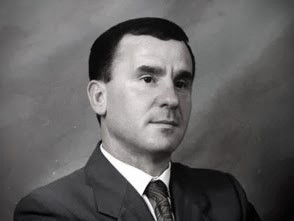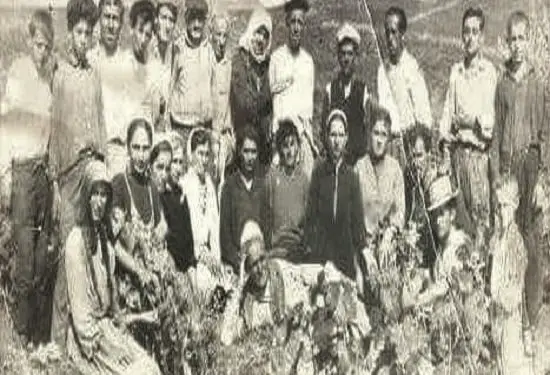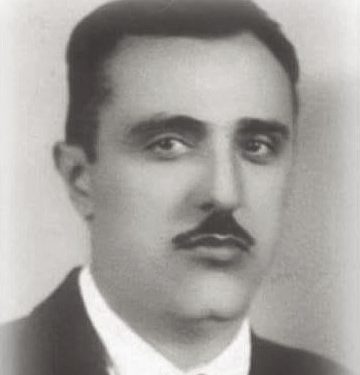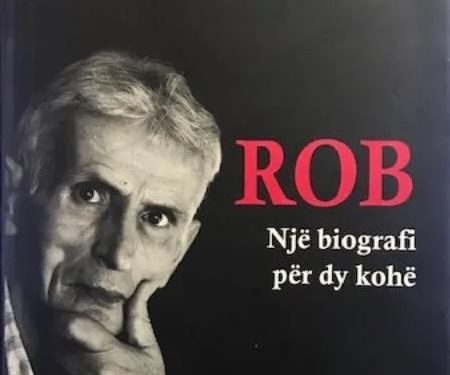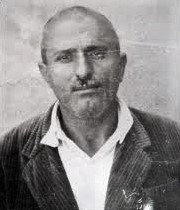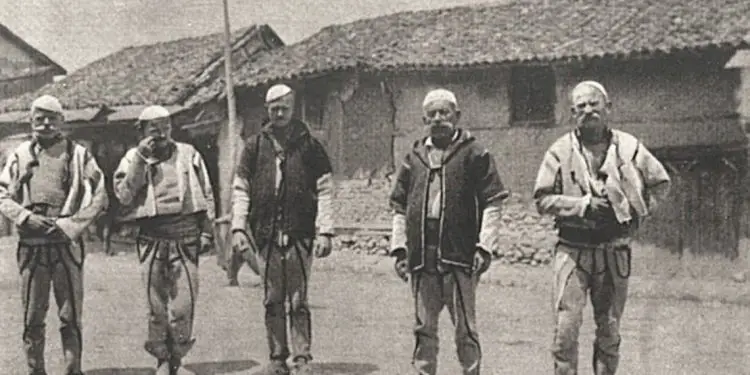By Klajd Kapinova
Memorie.al/ Suffering, has remained without cure. She was part of life in the Sina family, during the five decades of the communist regime of Enver Hoxha and his successor, Ramiz Alia. The usual and monotonous refrain was: infinite pain, animal abuse, extreme contempt and insult, poverty with bread of misery, systematic humiliation, continuous psychological and physical violence, exile and proletarian curses, deprivation of every basic human right, trampling for several generations…! These and many others have been the common denominator, which has accompanied the ordeal of suffering and hardships, the old ethnic Albanian family Sina, always distinguished historically, for the preservation and respect of traditions with typical autochthonous Dibran values. A few years ago, in the city of Brooklyn, in the state of New York, she closed her eyes, one of the most stoic women of the communist camps, one of the most sweet-spoken mothers, the simplest, modest to the point of suffering, exemplary, after all the history full of pain and deep wounds, which has accompanied her for decades, the immortal and unforgettable, for everyone in her homeland and America, the mother of suffering; Hane Sina!
But the story of the well-known family of Dibra e Madhe begins with the drama that involved mother Hana, when she was still a fragile child. Thus, from the historical sources and documents of the Sina family, we learn that at the age of 11, Haxhi Dishi, the little girl’s father, was killed (as they say in Dibër, for a “waterline”) by the closest family member (grandmother’s son), whose father, at that time, worked as the District Gendarmerie commander, in Dibër te Madhe…! The murder of Hana’s father, Beqir Sina, is hard to bear, because he loved him so much that he would not forgive anyone for the blood of Haxhi Dish. But great pain turns into strength, for real Albanian men, who know how to forgive blood, over deep pain. As loyal as he was, he later made him a housemate. This is a rare case that has happened until today in the province of Dibra e Madhe and the Albanian world.
A life of suffering and communist misery
Hana was born on May 18, 1928, in the town of Rreh Kale-Muhurr, Peshkopi. As his son, the passionate and tireless journalist of the Albanian-American community, Beqir Sina (mother Hana) remembers today, at the age of 12, fascist propaganda sent him to Italy together with a group of children from Dibra. They were joined by several other children from large families from all over Albania. District commander Beqir Sina did this kindness to the smart child at that time, to forget perhaps the murder of her father…! Events in the country-east precipitate rapidly. There, the communists, through the propaganda of lies, had succeeded in confusing young people and naive people with Bolshevism, who did not know the black face of the proletarians, who spoke and acted differently.
This was very clearly seen in Russia, with the triumph of the civil war, or as it is known differently, as the “Bolshevik Revolution” where power was taken by the Marxist ideologue, Vladimir Ilyich Lenin and the Siamese, the infamous Georgian dictator, Josif Visarianovich Stalin. Today, in terms of crimes in his time (according to contemporary historical sources), he is the first in the world and the second, the German Nazi Adolf Hitler. As many idealistic young people, with progressive dreams and goals, full of warm feelings of patriotism, they saw the return to their homeland as hope, for a real democratic life and freedom, as it was in Italy and many other countries of Western Europe.
But soon, the teenager’s dream darkens and her place is taken by successive misery and suffering, which have not occurred in the Sina family, for many decades, during the time of the rule of the Kuznets with hu, rope and propaganda deception of the red Tirana from 1944-1990. From the incomplete data of the Archives of the Ministry of the Interior, it appears that during this regime, 5157 people were killed and died in prisons, 9052 people were imprisoned as political prisoners, 17,900 people, 30,383 others were exiled for political reasons. From 1945 to 1988, 13,800 people escaped from Albania. For political reasons, 19,250 people were sentenced to imprisonment, forced labor and confiscation of property. Italian, Greek, Yugoslav, German, Austrian, Polish, Russian, etc. citizens have also suffered in Albanian prisons, forced labor and internment camps for political reasons.
Albania had about 40 closed prisons and over 50 forced labor camps with convicts for political motives. In these prisons and camps with forced labor, internment or suggestion within the communist prison state, 980 political convicts have died and 380 people have suffered psychological trauma. From November 1944 to March 1991, 450 women were executed. In fact, Hana’s return to Albania was a return like a slow journey to the cemetery, without realizing the slow death that was coming to all the nationalists and their families, who loved the homeland as their home…! Thus began the experience of the difficult path of the calvary of successive sufferings…! The noble and generous-hearted young woman Hana, one beautiful spring day, at the age of 19, marries the son of Beqir Sina, the young Rasim Sina, who came from a strong door of Albanian nationalism.
From historical sources, we learn that the husbands of the two widowed sisters-in-law (Dijen and Biden) were shot by the Slavic-communist regime in Macedonia, while the two sisters: Mihanen and Remen and his three brothers: Musa, Hashim and Besimi, and the noble woman Kafile Kaloshi, returned in 1949 from the Uznova Camp, after a temporary amnesty, to their village, in Kale District. The return was without hope and future, as they found the tower burned by the communists. The people who had been assigned and lived there before had stolen everything that was inside, destroyed it and then turned it into a cargo barracks for their army. It is interesting to say, that often the generosity of Albanians in the midst of poverty has shown the values of nobility and kindness, in the most dramatic moments of fellow natives.
Thus, it is learned that when the locals found out that the famous tower of the Sina family had burned down, they immediately expressed their concrete humanity, which emanated from their golden soul, helping him to set up the poor shelter, to open his new family. Without distinction, the entire village and other territories rose to their feet. The villagers gathered there and built a hut for Beqir Sina’s family overnight. Using the circumstantial tools and construction techniques of the time, they surrounded it with shingles (a type of material widely used at the time), covered it with birch, and then plastered it with mud and harasan. This was the miserable state of Dibra at that time and of Albania as a whole, which at that time was trying to fight extreme misery and backwardness, which deepened with the coming to power of proletarians without religion, homeland and ideas. Now extreme poverty sat cross-legged in Albanian families, in the city and in the village…! But on the other hand, the generous gesture was not missed by this noble family when they were in need, because everyone loved and respected Sinai…!
The misery as a fellow traveler, which plagued this family, a friend living today in New York, recalls like this: “Sina, which was once the first of this country, the Tower of Sins, they said now, was without bread, without lights, without bowls and spoons, without pots, without quilts and mattresses…”! The villagers and their relatives immediately began to offer something out of generosity in the midst of poverty, which, like a contagious disease, had affected everyone. The days passed quickly and the time was approaching, when Rasim would marry Hana, according to the word given, according to tradition and custom. It was really a simple Albanian wedding, without the noise and crackling of guns, which often happened in Albanian celebrations yesterday and today…! “And so the wedding took place. In that house, the drums of the celebration were not heard, but there was a wedding with symbolic ceremony and simple joy, without meat,… and only a few relatives came to the farm and sang a little that night…”, remembered many years ago, the young bride at that time, Hana, 19 years old, and the groom Rasimi, 16 years old.
In that simple hut, God gave the young couple three children. The first child was a girl; Zenepja, the second Dika and the third well-known journalist, Beqir Sina…, started in that hut… and was born in the barracks of the notorious internment camp of slow extermination, in Savër of Lushnja…! With the escape of Rasim, thanks to the generous help of a loyal member of the Sina family, their mother, as the mountaineers called her in the camp (oj) Sojnike, or as it was customary for large families, to respect each other, they were called only by their last names. One day Kaloshia gathered all her children around her and asked them when they would escape?! But there was also the young bride, seven months pregnant, with the child Beqir in her womb, who said that I was only listening and, as usual, I could not open my mouth…! Sojnikja, said to the boys: “My sons, may God give you light wherever you go, because the mother started with tesa on her arm, and I am leaving her with tesa on her arm, but thank God, this time I also have a new daughter-in-law… and we will spend it with all the other mothers, because we are used to the internment camps, because our friends are waiting for us there…”!
And so the young bride Hana, with the child in her womb (as the women of Dibra used to do), tied the scarf and with the Kalosh from the big door of the Kaloshes of Kandri, (Musa, who suffered misery in prison), made their way to the marshes of Myzeqe. All those who knew him during the communist regime and afterwards, when they met and talked with the noblewoman in the house of Beqir Sina (like the author of this article K.K.), in Brooklyn, New York, speak with great respect about the good impressions that meetings with Sojniken dibrane, as everyone called her until she left this life…! She was very fair and honest, generous hearted, brave, smart, with a subtle and burning humor (thorn), for the communists (just like the Shkodra anti-communist barsolets, at the time of the regime).
It is precisely these qualities, such as: honesty (incorruptible), loyalty to death, manliness and intelligence, generosity and hospitality, commitment to see things through decisively to the end, keeping his word, positive qualities, that he clearly sees in his son, the realistic and tireless journalist Beqir Sina, whom everyone loves and respects in our community in America. He was also loved by fellow sufferers in Savër of Lushnja…!
The generosity of her soul came from the family’s inherited genius, because it was a great noble door, next to the doors of the paria of Albania at that time, who, for the wonder of history, were all exiled, in the infamous deadly hell of the camp in Savër of Lushnja. Hundreds and thousands of boys and girls, men and women, widows and orphans, who came from intellectual and patriotic families, educated in Western Europe, had entered the hellish doors of this Nazi camp (with the name proletarian) and came out of there, physically destroyed, but mentally strong, in 1990, they survived the threshold of death, where many died from the collection of diseases and medical carelessness, during the five decades of the communist regime. In Albania, about 6,150 people, of which 450 were women, were shot by the communist regime for political reasons. Albania has had about 36,000 political prisoners, of which about 5,900 have died in custody or in prisons, including 200 women.
Political sentences ranged from 7 to 40 years in prison. Albania had about 52,000 internees, of which about 7,100 died in the internment camps. Around 11,536 families were evicted from the main cities and border areas, with or without court decisions. Political prisoners have built about 38 large industrial works, without court decisions…! Anyone who has been interested and has read or learned about the painful history of Savra, knows very well that the Albanian paria lived there during the years of collective imprisonment, as were the most vocal families of that time, such as: the Markagjons; the great family of Oroshi of Mirdita, the outstanding and very important spiritual and patriotic leader of the Albanian-American community, the Founder of the First Albanian Catholic Church in the USA, Monsignor. Dr. Zef Oroshi (1912-1989); The Muzhans, relatives of Dede Gjon Luli, Llesh Marashi, Prekë Calit, the well-known Prendush Gegë e Puka family, etc. etc.
Like many young brides, who were newly settled with their families in the internment camp, they were generously helped by all the early residents there, who came in time from different cities and areas of Albania and Kosovo. An interesting detail has remained deeply embedded in the memory of the Sina family and more so the son (my colleague, Beqir Sina), who, among other things, tells about the generosity of the Markagjoni family, which was found in the first days of the newly arrived family in the internment camp. Thus, the generous-hearted daughters of the Captain of Mirdita Gjon Markagjon, Bardha and Marta, bought her new clothes and made Hana smile even a little, in a new environment, surrounded by good people and not as the communist media wrote, through its slanderous propaganda…! The wives, mothers, sisters, brothers, children, relatives of those patriotic men, good and devoted fathers, who, under the barrage of machine gun bullets at the border, had escaped from the communist hell, for a free life in democracy, suffered even more, because of their anti-communist activity, in the countries of Western Europe and the USA.
Thus, the more they raised their voices in front of the State Department, congressmen and senators who are friends and benefactors of the Albanians, the more the sword of the class war in Albania sharpened, towards their family members already in prisons or concentration or extermination camps. So the word comes, Rasimi, Hana’s husband, spoke as an announcer, for many years in a row on the radio “Zani i Atdheut”, in New York, which, once a week, broadcast programs in the Albanian language, against the communist government in Tirana, the more the anger of the party-state of the dictatorship grew, against the Sina family, who suffered the long ordeal of eternal persecution, with which she was sentenced…! Hëna Sina, was one of the three daughters-in-law of the Sins, who, together with their noble mother-in-law Kafile (Kaloshi) Sina, suffered incredible destruction, destruction and suffering.
She starts her life as the wife of Rasim Sina, but with his escape, she loses everything in the blink of an eye! For that of many others like her, the terrible and endless hell of the dictatorship camps begins…! The years pass and democracy with difficulty kicks the lethargic sleep of the Albanians, who willingly or unwillingly remember that they are part of this world, that they should live freely and in democracy…! After the fall of communism in Albania, Hane Sina settled in the USA together with the family of her son, the staunch anti-communist journalist Beqir Sina. During her youth, she had received many diseases, which greatly burdened her health, and she spent the last years of her life under the direct service of the noble woman of Beqir…! This noble typical Albanian mother will be remembered by the Albanian community in the USA, all those kind friends who had the opportunity to know her closely…!
The internment barracks in Savër
In the terrible internment camp in Savër of Lushnja in Albania, there were 7 underground barracks, which could collapse from minute to minute…! This was a slow but sure death that the communist Security had thought about the annihilation of the Albanians. The Nazis, in their monstrous crimes, have never killed fellow ethnic Germans, as the communists have done in the countries of Eastern Europe and everywhere in the world, where they have ruled by force, through the direct violence of the hook and the rope. Thus, world historiography mentions the significant fact that during the Second World War, the German Nazis massacred and killed, disappeared in crematoriums in concentration camps in Auschwitz and Mathausen, etc. over 56 million people, where, unfortunately, 6 million are Jews, while communism to date, from reliable historiographical sources and experts, who have dealt with the disclosure of the crimes of communism, has reached the figure of 120 million innocent people all over the world…! The stoic heroine, mother Hane, stores in herself thousands of events, episodes, dramas, pain, suffering, mistreatment, exile, etc. It is the very story of thousands of former persecuted and politically persecuted people, during the brutal communist regime of the country’s dictator.
“The barracks on the ground floor were covered with eternit roofs (a kind of recycling material, very poor in quality) and within those walls made of straw, one of the masterpieces of world literature, “Orlando goes mad”, by Ludovico Ariosto, was translated (under conditions of surveillance and punishment) by an outstanding intellectual and professor, Guliem Deda; In those barangays, the translator (from the original in Albanian) of Dante Alighieri’s “Divine Comedy”, the polyglot Pashko Gjeçi, also lives; edited by Llazar Siliqi. There he spent the last days of his life in silence, after a long prison, one of the most famous Cham figures, Rexho the Elder, and his wife, Teme Sejko’s sister: Merushe the Elder, his only son Agimi; that’s where, after a long prison, Anton Dukagjini died, from the famous door of the Dukagjini; there, after he got out of the first prison that he started as a child, he married Ahmet Kolgjini, the only son of Tahir Kolgjini; and there, a few years before 90, he died of a serious illness, leaving behind four small children, the honorable consul, Ligor Kalivjoti…!
Musa Sina, Beqir Sina’s son, lived there, Muharrem Bajraktar’s son, Kol Bibë Miraka’s son, Gjon Mark Gjon’s son, Prof. Dr. Lazër Radi, Čapaj of Dukat, Asllani of Tepelena, the family of Prime Minister Fiqiri Dine, Dom Mikel Koliqi (the first Cardinal in the glorious history of the Catholic Church in ethnic territories) lived, Kaloshët of Dibra, Ndreu of Dibra, Spiro Gjoka of Përmet, Tasim Spahiu of Luma, the family of Tahir Hoxha of Tropoja, Laholli of Korça lived,” recalls the former fellow sufferer in The camp of Savëri in Lushnja, the journalist of the Albanian-American community, Beqir Sina. “Here was my fate. A child, who was not even born and in the mother’s boat, would be sentenced to exile in the huts of Savra and would be declared “Enemy of the People”, by the decision of the Ministry of Internal Affairs, Department of Internment and Deportations (official document of the Archives of the Ministry of Internal Affairs, August 12, 1957 A-D/427) – So, an orphaned child would be born and raised, deprived of every dream of childhood. . And, I, one of those thousands of victims of the communist regime, together with my family (wife, mother, and two children, son and daughter), after many vicissitudes, after we first passed Budapest, Hungary (two months) and a year and a half in Austria, finally in February 1991, we came to the dream country of all citizens of the world, the United States of America. The only place, where the hopes of freedom and democracy are raised…”, my Albanian-American colleague, the well-known journalist of our community Mr. Bekir Sina.
The place where, half a century ago, Beqir’s father, his uncles and almost his entire family circle, his father’s first cousins and his uncles, had come as refugees from Albania. These people, from the journalist Sina’s family, who had immigrated to America, both before and after the Second World War (WWII), and had also served in the American army, in wars such as: in Vietnam and Korea. However, when he came to America, he was 34 years old, and he was not younger, but it seemed to him that he was “born” that day. His father escaped from Albania in August of 1957, when Beqiri was in his mother’s womb (7 months old), who (as the regime of the time) was exiled for the only “fault” (remember the famous movie “Guilty without guilt”) that he had committed, because a 20-year-old woman with three children, after her husband had fled, because he could not tolerate and agreed with the communist regime of Enver Hoxha…!
The saga of deportations
With a few clothes behind the soul on the arm, the Sina family began to walk on the biblical journey, from one death camp of proletarian red Nazis, to another one of suffering, since 1949. The geographical map of successive sufferings has a confusing distribution. Thus, he begins the ordeal of extreme persecution, from Delvina, and continues regularly in the terrible death camps, such as: in Bênçë Tepelënë, Porto Palermo, Kuçovo, Ura Vajgurore, Këneta e Maliqi (Korçë), Radostina (Fier), the Brick Factory in Tirana, etc., exhausting him before the ordeal of death, throughout his life in Albania, where, their only home, was the cold prison cell everywhere, as: in the prison of Burrel, Spaçi, Gjirokastra Castle, Saint Kollë-Zejmen, Ballsh and in Tirana…! On the first day of the war in the first appeal (where the names of the prisoners were called), the families of the first camp of endless violence would answer: Markagjoni, Pervizi, Bajraktari, Dukagjini, Kokali, Dine, Vatnikaj, Koliqi, Biçaku, Mulleti, Alla, Merlika, Topalli, Radi, Alizoti, Matjani, Kupi, Dosti, Kaloshi, Tinaj, Kolgjini, Sina, Bami, Plasoti, Mu losmani, Neza, Koliqi, Ndreu, Laholli, Meraja, Kuqeshi, Kulla, Dine, Brahimaj, Belishova, Poda, Nela, Gashi, Prengjoni (Zherkaj) Spaho, Thano, Kaba, Guveli, Agolli, Iljazi, Gjoka, Suljoti, Spahiu, Pellumbi, Tola, Çeliku, Koleci, Kolgjini etc… a long list of kilometers, which was supplemented daily with “fresh meat” from the eternal “class war”.
Not a little to be a legend, the families of five Albanian prime ministers would pass through that place: Koço Kotë, Fejzi Alizot, Mehdi Frashër, Mustafa Merlikës and Fiqiri Dines! It is a unique case that there cannot be any village in this world where five families of prime ministers have lived in poverty. Well, Albania has a historical example, Savra, just like Auschwitz and Mat’hausa in Germany. This is how Savra arose first, the place of exemplary punishments, and after it, “mushrooms” of the same bitterness would be born everywhere; first, Myzeqeja would be populated with: Čerma, Gradishta, Grabiani, Plugu, Dushku, Gjaza, Sulzotaj, Rrapza, etc. and then throughout Albania, such as: Shtyllasi, Radostina, Belshi, Shtylla, Adriatiku, Akernina, Lubonja, Bedati… and so on!
Erudite Jozef Radi, the son of one of the most prominent intellectuals of that time, (Prof. Dr. Lazër Radit), in his memoirs, writes that: “The films of Italian neorealism, and the artists of its time, have nothing more than these boys and girls of the old Savra, out among a field of cotton, of course after daily fatigue, and that really does not show! They are the brightest manifestation of that youth… and I would like to mention them one by one: Lekë Bajraktar, Adnan Hoxha, Lirie Bajraktar, Irena Dukagjin, Rukie Hoxha, Kastriot Bajraktar, Sazan Dinen, Neriman Hoxha, Vera Dema, Lekë Dukagjin; who are in this photo, but I can’t stay without joining the many who are not there, but they are one by one in my memory, as if it were yesterday: Veronika, Ernest, Leka and Tomorr Dosti, Gjosho Vasija, Nikolin and Zheta Destanishta, Pano Taçi, Elami, Ajete and Luftanije Agolli, Kristina, Çapestina and Gjon Markagjoni, Pjerin Janan, Gëzim Barutin, Fadil and Tefta, Di we and Tomorr Dinen, Tefta Bajraktarin, Reshit Mulletin, Dhurata Tabakun, Kin Bashen, Meri Topallin, Ahmet and Feride Kolgjinin, Fatbardh and Hyrie, Dudie Kupin, Ilir Spahiun, Idriz Cafen, Spiro and Marika Anastasin, Xhevat Lamçen, Sanije Metalian, Tefik Çelon, Ali and Rudina Demën, Ilir and Fatima Biçakun, Luçie Grizhën, Naim Staravecka, Abaz Alizotin . France, the famous volleyball player… and many other names, who gave youth and life to that country; and those who designed Savra as a “Gulag” of spiritual and physical destruction failed!
They failed miserably! Neither with the endless years of imprisonment, nor with the daily terror of fatigue and campaigns, nor with appeals three times a day, nor with unmaskings, nor with mass migration to other camps… they did not manage to kill the spirit that Savra created!
Albanian-American journalist Beqir Sina
Today, he lives and works with his family in the Blessed States of America, where freedoms and human rights are an example all over the world, as he is rightly known as the Champion of World Democracy. For 34 years in a row, the eldest son of the Sina family, the determined anti-communist son Beqiri, stayed in the internment camp in Savër, Lushnja, where he grew up with inhuman suffering. He was not alone, but he had many co-sufferers, children, deprived of every basic human right, like many children of the best families in Albania at that time, as the productive journalist Sina says: “The chosen cream of the nation, even from those who had been former signatories of the Independence of Albania, former ministers and prime ministers in different governments at the time, families of patriots, such as: Dede Gjon Luli, Safet Butka, and others, patriots actors, intellectuals, successful families in business (very rich), religious leader and former politician of the highest ranks, starting from the time of Zog, fascism and Nazism, and from Enver Hoxha’s regime itself”.
The children of the internment camps today are middle-aged men and women, good family members and honest citizens, who have graduated in the West (after completing their schooling in the internment camps) and cannot have forgotten the days when they were turned into slaves by the dictatorship of the ferocious dictator Hoxha. There are many who today try to justify their life (education) or others, in the time of dictatorship, saying that it was the system (left without school) to relativize the crime that the regime made to this strata, to leave it in ignorance and darkness, to make it as acceptable as possible for the society today. However, crime is crime and it must be punished, at least morally, at all times.
The exploitation of minors (children of internment camps, only for agricultural work), in work by the dictatorship, was a crime and should be treated as such, even today, after 33 years have passed since the stupidity of that regime, that it should never happen again, says Beqiri, adding that: “The 8-year-old school children, whom the dictator encouraged to go to work (without remuneration), were aged 9-14, and after they sent her to the army, to the hardest labor divisions. Referring to the labor code of the years of the communist period, children could work from the age of 15, up to 6 hours, and the school doors were closed to them”.
To illustrate this fact, among other things, he begins to confess that the first cousin of Enver Hoxha’s father (a noble man), Veip Hoxha with Anena and his three daughters (Neriman, Andanen and Suzanen), were interned in 1965, by the person closest to them (the uncle’s son), i.e. Enver Hoxha. Veipi was a pedantic old man, educated in Istanbul and mastered four foreign languages. He had been the Director of the State Bank in Tirana, before being exiled, but he died in exile, despised by communism as an ordinary man. Aneja and her daughters, who were essentially distinguished for a broad and deep western culture, as they possessed many foreign languages (Italian, French, English and Russian), showed a great love for the journalist Beqir Sina, while he was going through the long ordeal of persecution in the infamous camp of Savra in Lushnja. They loved the fragile boy Sina, as if he were their little brother, since he was left an “orphan” with a living father, who fled to the USA.
Beqiri was the child loved by prominent intellectual girls and they often remembered him with something good (food, as the only luxury in the concentration camps), when they cooked, or helped him more in cultural education and books. The internment camp, for the future and beloved journalist of our community in America, was a school, where knowledgeable and far-sighted people on suffering found strength and courage to teach free lessons to the smallest co-sufferers. The girls, or the three noble sisters, secretly taught him several hours a day in Italian, together with Dr. Prof. Lazar Radin, a man with two doctorates (who had studied in Rome), whose children, Beqir Sina, had peers, sharing family joys and sorrows as brothers…! Memorie.al





